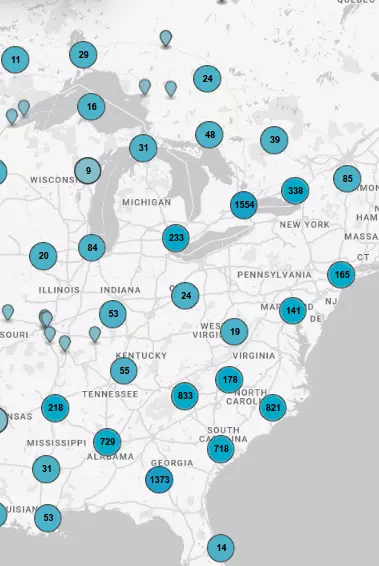Emily Howard Jennings Stowe, M.D. 1831-1903
The first female physician to practise medicine in Canada, Emily Jennings was born in Norwich Township to Quaker parents. For some years she taught school, then, in the early 1860's, she decided...
- toronto
- ontario
- alan brown
The Edison Homestead
On this site stood the home of Samuel Edison, a Loyalist from New Jersey who had moved to Nova Scotia in 1783 and settled here in 1811. During the War of 1812 he served as a captain in the...
- toronto
- ontario
- alan brown
Ebenezer Allan 1752-1813
Born in New Jersey, Allan joined the Loyalist forces in 1777 and served with Butler's Rangers and the Indian Department during the American Revolution. The founder of Rochester, N.Y., he moved to...
- toronto
- ontario
- alan brown
Early Land Survey in Ontario
In September 1783, Deputy Surveyor-General John Collins was despatched to Cataraqui by Governor Haldimand to lay out townships for loyalist settlers. The necessary land was purchased...
- toronto
- ontario
- alan brown
Elizabeth Posthuma Simcoe 1766-1850
The wife of John Graves Simcoe, first Lieutenant- Governor of Upper Canada, Elizabeth Posthuma Gwillim was born at Whitchurch, Herefordshire. Her diaries and sketches, compiled 1791-96 while...
- toronto
- ontario
- alan brown
The Dundas Town Hall
Dundas was incorporated as a town in 1847 by a special Act of the legislature of the Province of Canada. The following year the town council accepted a tender from a local builder, James Scott, to...
- toronto
- ontario
- alan brown
District Court-House and Gaol 1843
This excellently proportioned structure was designed in the Neo-classical style by Malcolm McPherson of Perth. Its notable architectural features are the "floating" semi-circular leaded transoms...
- toronto
- ontario
- alan brown
Detention of Second World War Prisoners of War and Great Britain's Enemy Aliens
From 1940 to 1947, Canada detained some 34,000 German combatants, Great Britain's civilian internees, and enemy merchant mariners in 26 permanent camps and hundreds of smaller work camps across...
- toronto
- ontario
- alan brown
Daniel McLachlin 1810-72
One of the Ottawa Valley's most enterprising lumbermen, McLachlin was born in Rigaud Township, Lower Canada, and by 1837 had built a sawmill and grist-mill at Bytown (Ottawa). In 1851,...
- toronto
- ontario
- alan brown
David Brown Milne 1882-1953
One of Canada's outstanding artists, Milne was born on a farm near Burgoyne, Saugeen Township, and raised in Paisley. Though largely self-taught, he studied briefly in New York at the...
- toronto
- ontario
- alan brown
District Court House and Gaol
When the British withdrew from Detroit in 1796, they transferred the courts of the Western District to Sandwich (Windsor). An abandoned blockhouse, relocated from Chatham, served briefly as the...
- toronto
- ontario
- alan brown
The Destruction of the Caroline, 1837
On the night of December 29-30, 1837, some 60 volunteers acting on the orders of Col. Allan Napier MacNab, and commanded by Capt. Andrew Drew, R.N., set out from Chippawa in small boats to capture...
- toronto
- ontario
- alan brown
Dixie Union Chapel
Constructed of stone from the nearby Etobicoke River, this building also known as the Stone Chapel, is a rare surviving example of a "union" chapel from the settlement period of Upper Canada. It...
- toronto
- ontario
- alan brown
Daniel David Palmer (1845-1913)
Raised in Port Perry, D.D. Palmer was self- educated, well read and keenly interested in spiritualism and alternative medicine. While working as a magnetic healer in the United States, his...
- toronto
- ontario
- alan brown
Daniel Fowler 1810-1894
In this house Daniel Fowler, a well known nineteenth century Canadian artist, lived for over forty years. Born in England he first took up law, but on the death of his father studied art under the...
- toronto
- ontario
- alan brown
The Dawn Settlement
In the 1830s, the Reverend Josiah Henson and other abolitionists sought ways to provide refugees from slavery with the education and skills they needed to become self-sufficient in Upper Canada....
- toronto
- ontario
- alan brown
District Court-House and Gaol 1832
An Act of the legislature of Upper Canada in 1831 named Prince Edward County a separate judicial district. Land for a court-house in Picton was given by the Rev. William Macauley and construction...
- toronto
- ontario
- alan brown
Dr. Henry Norman Bethune 1890-1939
An internationally-famed humanitarian, surgeon and revolutionary, Bethune was born in this house. He graduated from the University of Toronto's medical school during the First World War and...
- toronto
- ontario
- alan brown
Dundurn Castle
This villa was completed in 1835 for Allan Napier MacNab. Incorporating an existing farmhouse, it was designed by the local architect, Robert Wetherell, as a statement of its owner's place...
- toronto
- ontario
- alan brown
District Court-House and Gaol 1833
The central portion of this building was completed in 1833 and served as the court-house and gaol of the Eastern District. First named Luneburgh, this district was established in 1788 by...
- toronto
- ontario
- alan brown
